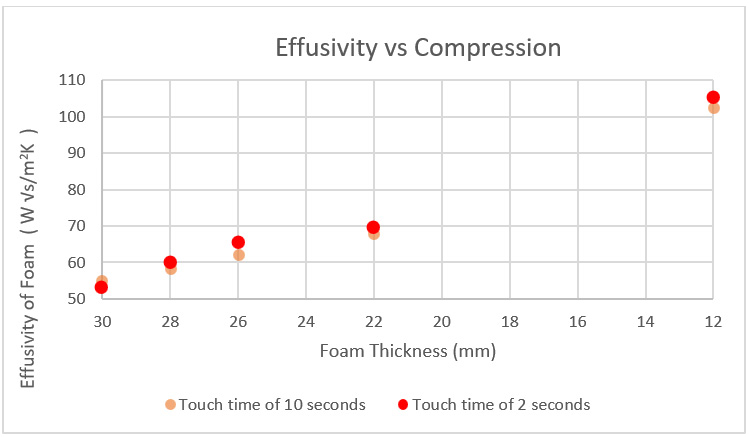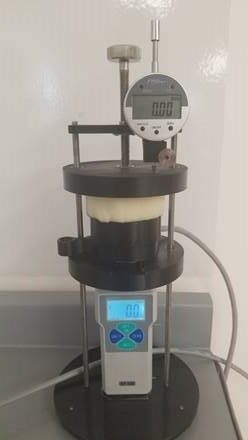The Thermal Effusivity (W√s/m2K) of mattress foam was measured using TPS-EFF (Transient Plane Source-Effusivity) at different compression levels.
TPS-EFF is a portable thermal effusivity meter for textiles with a thermal effusivity measurement range of 35 to 1700 (W√s/m2K) and a temperature range of -10 ºC to 50 ºC. A single measurement can be set to 2 or 10 seconds in duration. The experiment was conducted in accordance with the ASTM D7984-16 standard of testing method.
Thermal effusivity is most typically measured to predict how ‘cool’ or ‘warm’ a textile feels. It has a square root proportionality to the density, thermal conductivity and specific heat capacity of the material. Highly dense textiles made out of materials with high thermal conductivity and specific heat capacity values have high thermal effusivity values and it is also true the other way around. The difference in touch time should not have an impact on the thermal effusivity values since the sample foam in monolithic.
In this experiment, there was one mattress foam measured for its thermal effusivity for 5 compression levels using TPS-EFF for both a touch time of 2 and 10 seconds. The more compressed the foam is the denser it becomes. Therefore, thermal effusivity measurements when the mattress foam is more compressed should be higher compared to thermal effusivity measurements when the mattress foam is less compressed.

Image 1. Graph of thermal effusivity values of foam plotted against compression levels (foam thickness) with two series of touch time of 10 seconds and 2 seconds.
As expected, the results indicated that the effusivity of foam increases with increased foam compression, which consequently increases the material density. The results indicate a change in penetration depth did not impact the thermal effusivity values.

Image 2. TPS-EFF Compression Stand
TPS-EEF has an accuracy over 5% discrepancy and reproducibility over 2% discrepancy, making it a highly accurate and precise instrument for measuring thermal effusivity of textiles and other materials.